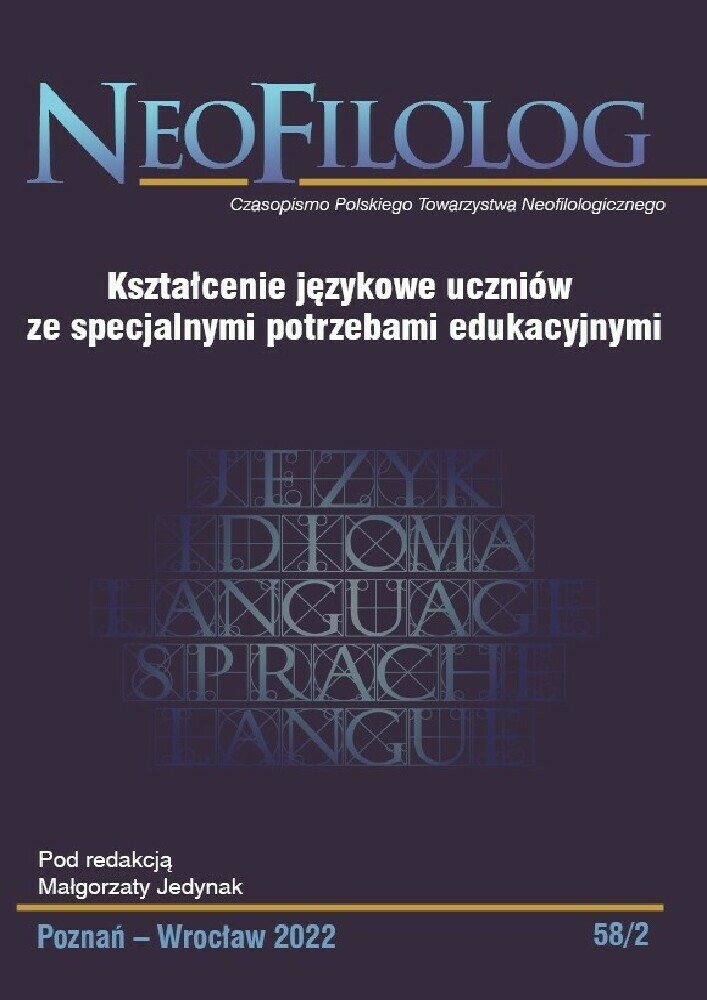Abstract
The 2020/21 academic year proved to be unprecedented in many ways for students and lecturers alike. The need to move from traditional education to a virtual classroom during the Covid-19 pandemic became a stimulus to seek new ways to work and expand knowledge. The aim of this paper is to present the outcome of project work completed by university students of a teaching specialization, which included ways of teaching and ICT tools suitable for working with learners with Special Educational Needs (SEN) in a traditional classroom and in a digital environment. With the increase in remote learning, the challenge of meeting the needs of learners with SEN is considerable. Therefore, inclusive classrooms should be designed with remote learning in mind, so that the teachers are ready to substitute or enrich traditional resources with educational technologies. With the right solutions, teachers can innovate and redefine their classrooms, remodelling them into a mix of face-to face and online delivery. However, different categories of SEN require different solutions. The analysis of the projects confirms that when students are involved in problem-solving and focusing on solutions, they learn more about how to contribute to effective learning in a meaningful way.
References
Barkley R. A. (2013), What to Expect: The Nature of The Disorder. In Taking Charge of ADHD. The Complete, Authoritative Guide for Parents. Nowy Jork: Guilford Publications, Incorporated.
Bönsch M. (2009), Erfolgreiches Lernen durch Differenzierung im Unterricht. Braunschweig.
Centralna Komisja Egzaminacyjna, CKE (2020a), Komunikat dyrektora Centralnej Komisji Egzaminacyjnej z 20 sierpnia 2020 r. w sprawie szczegółowych sposobów dostosowania warunków i form przeprowadzania egzaminu maturalnego w roku szkolnym 2020/2021. Online: https://www.cke.gov.pl/images/_KOMUNIKATY/20200820%20EM%20Komunikat%20o%20dostosowaniach.pdf [DW 8.02.2022].
Centralna Komisja Egzaminacyjna, CKE (2020b), Komunikat dyrektora Centralnej Komisji Egzaminacyjnej z 20 sierpnia 2020 r. w sprawie szczegółowych sposobów dostosowania warunków i form przeprowadzania egzaminu ósmoklasisty w roku szkolnym 2020/2021. Online: https://cke.gov.pl/images/_KOMUNIKATY/20200820%20E8%20Komunikat%20o%20dostosowani ach.pdf [DW 18.02.2022].
Connor J. (2017), Meeting special educational needs and disabilities: your responsibility. In addressing special educational needs and disability in the curriculum: modern foreign languages. Londyn: Routledge.
Delaney M. (2016), Special Educational Needs. Cambridge: Cambridge University Press.
Jaworska M. (2013), Indywidualizacja procesu nauczania języków obcych a instytucjonalny kontekst edukacyjny. „Lingwistyka Stosowana”, nr 8, s. 43–52.
Jaworska M. (2016), Nauczyciel języka obcego wobec problemu indywidualizacji procesu nauczania. „Orbis Linguarum”, nr 44, s. 289–299.
Król-Gierat, W. (2020), Teaching English to Children with Special Educational Needs. Kraków: Wydawnictwo Naukowe Uniwersytetu Pedagogicznego.
Kubala-Kulpińska, A. (2018), Uwaga, uczeń z dyskalkulią – wsparcie potrzebne od zaraz. „Głos Pedagogiczny”, nr 92. Online: https://www.glospedagogiczny.pl/artykul/uwaga-uczen-z-dyskalkulia-wsparcie-potrzebne-od-zaraz [DW 29.06.2022].
Leons E., Herbert C., Gobbo K. (2009), Students with Learning Disabilities and AD/HD in the Foreign Language Classroom: Supporting Students and Instructors. „Foreign Language Annals”, nr 42, s. 42–54.
Łodej M. (2016), Dyslexia in first and foreign language learning: A cross-linguistic approach. Newcastle upon Tyne, UK: Cambridge Scholars Publishing.
Meyer H. (2004), Was ist guter Unterricht? Berlin: Cornelsen Verlag Scriptor.
Rozporządzenie Ministra Nauki i Szkolnictwa Wyższego z dnia 25 lipca 2019 r. w sprawie standardu kształcenia przygotowującego do wykonywania zawodu nauczyciela, Online: http://isap.sejm.gov.pl/isap.nsf/download.xsp/WDU20190001450/O/D20191450.pdf [DW 21.02.2021].
Rak K. (2021), Differentiated instruction in an inclusive classroom as perceived by the EFL teachers. Niepublikowana praca magisterska. Uniwersytet Pedagogiczny im. KEN w Krakowie.
Skibska J. (2014), Dziecko w młodszym wieku szkolnym z trudnościami w uczeniu się czytania i pisania – doniesienia z badań, (w:) Karpińska A., Zińczuk M. (red.), Dydaktyczna refleksja o edukacyjnych priorytetach. Warszawa: Wydawnictwo Akademickie ŻAK, s. 118–132.
Szczepankowski B. (2009), Wspomaganie rozwoju dziecka niesłyszącego. Audiofonologia pedagogiczna. Warszawa: Wydawnictwo Uniwersytetu im. Kardynała S. Wyszyńskiego.
Tönshoff W. (2004), Binnendifferenzierung im lernerorientierten Fremdsprachenunterricht. „Deutsch als Fremdsprache” nr 4, s. 227–231.
Wdówik P. (2010), Technologie asystujące dla uczniów niewidomych w zakresie czytania i pisania, (w:) Witczak-Nawotna J. (red.), Wspomaganie uczniów z dysfunkcją wzroku w szkołach ogólnodostępnych. Wybrane zagadnienia. Warszawa: Biuro ds. Osób Niepełnosprawnych Uniwersytetu Warszawskiego, s. 61–60. Online: http://henrykl.home.amu.edu.pl/Publikacja/wspomaganie_uczniow.pdf [DW 28.06.2022].
Zawadzka-Bartnik E. (2010). Nauczyciel języków obcych i jego niepełnosprawni uczniowie (z zaburzeniami i dysfunkcjami). Kraków: Oficyna Wydawnicza „Impuls”.
License
Copyright (c) 2022 Werona Król-Gierat, Katarzyna Rak

This work is licensed under a Creative Commons Attribution-NoDerivatives 4.0 International License.
Authors
Authors of texts accepted for publication in Neofilolog are required to complete, sign and return to the Editorial team’s office the Agreement for granting a royalty-free license to works with a commitment to grant a CC sub-license.
Under the agreement, the authors of the texts published in Neofilolog grant Adam Mickiewicz University in Poznań a non-exclusive, royalty-free license and authorize the use of Attribution-NoDerivatives 4.0 International (CC BY-ND 4.0) Creative Commons sub-license.
The authors retain the right to the free disposal of the work.
Users
Interested Internet users are entitled to use works that have been published in Neofilolog since 2017, under the following conditions:
▪ attribution – obligation to provide, together with the distributed work, information about the authorship, title, source (link to the original work, DOI) and the license itself.
▪ no derivatives – the work must be preserved in its original form. Without the author's consent, it is not possible to distribute the modified work in the form of translations, publications, etc.
Copyrights are reserved for all texts published since 2017.
Miscellaneous
Adam Mickiewicz University in Poznań retains the property right as a whole (layout, graphic form, title, cover design, logo etc.).

